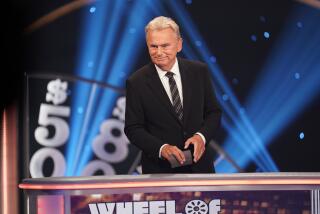The Feminist Link
- Share via
Anne Robinson, the super-snippy Brit who hosts NBC’s new game show, “The Weakest Link,” has been called many things since the program debuted: “dour,” “sarcastic,” “merciless,” even “sadistic.”
Curiously, the most remarkable thing about her seems to have escaped notice: Robinson is a woman.
In the long and proud history of the American game show, this is a stunning fact. Women don’t host game shows. They host talk shows, sure. They anchor newscasts, certainly. They run companies, households and governments. But game shows are as rarefied a male preserve as an NFL locker room.
A few women have held the quiz cards. But here’s your special lightning-round bonus question: Can you name even one?
(Sound of bridging theme music) . . . OK, time’s up.
The “personalities” appendix of “The Encyclopedia of TV Game Shows” (1995) lists 22 women who were hosts (or in many cases, co-hosts) of game shows during the preceding 47 years. Four women, including Arlene Francis and Gypsy Rose Lee (Gypsy Rose Lee!), briefly made it as prime-time quiz show hosts in the early 1950s.
David Schwartz, a co-author of the encyclopedia, estimates that 60 new game shows have been developed (mostly for cable channels) since the last edition was published in 1999; he couldn’t recall any hosted by women.
Men? Let’s put it this way: Wink Martindale--he of the perfect Pepsodent smile and the immovable hair--has hosted almost as many game shows during his career (19) as there have been female hosts through TV history.
Schwartz’s book lists 428 men who’ve hosted programs.
These range from game-show gods like Martindale, Monty Hall, Art Fleming, Tom Kennedy, Art and Dennis James, Bill Cullen and Jack Barry to curiosities like Walter Cronkite (he hosted “It’s News to Me” in 1954) and Charlton Heston (a substitute host on “The $64,000 Question” in 1957).
The game show hall of fame would also include Jim Lange, Gene Rayburn, Peter Marshall, Bob Eubanks, Allen Ludden, Bob Barker and Chuck Woolery. The modern era includes titans such as Alex Trebek, Pat Sajak, Ben Stein, Jeff Probst and, of course, Regis.
It’s been three decades since the modern feminist movement transformed virtually every American institution.
In game-show land, it’s still the age of the Neanderthal.
The highest status generally accorded women in the rigid game-show social hierarchy has been “panelist.” Panelists answer questions and solve puzzles, of course, and they are valued for their wit. But it’s a middle-management gig. Panelists don’t have real authority. They can’t initiate the action or direct it, nor can they engage in the “Most shows in the 1960s and ‘70s were daytime shows, as opposed to the evening shows you have now,” he says. “The audience at home during the day tended to be female, and the thinking was, they didn’t necessarily want to watch
another woman hosting a show. They wanted to look at a man.”
WINK MARTINDALE
ceremonial greeting or sign-off.
Even so, it’s better than the game show’s pink-collar ghetto. “Wheel of Fortune’s” Vanna White, along with Barker’s Beauties on “The Price Is Right,” come from a tradition of subservient, ornamental roles. Women (almost never men) have been performing these incidental functions since game shows began.
The game-show encyclopedia lists these jobs under various noms de show biz: “model,” “assistant,” “scoreboard girl.” Two women from the 1950s are described as “dancing cigarette packs.”
Martindale, who’s just written his autobiography (“Winking at Life: God, Country, Mom and Apple Pie”) and is developing new game shows, has his own thesis on game-show gender politics.
“Most shows in the 1960s and ‘70s were daytime shows, as opposed to the evening shows you have now,” he says. “The audience at home during the day tended to be female, and the thinking was, they didn’t necessarily want to watch another woman hosting a show. They wanted to look at a man.”
But this is now. And where, aside from Robinson, are the women?
Jake Tauber, a veteran game-show writer (“The Match Game”) and producer, says men tend to control game-show production. Producers tend to cast in their own image.
“Don’t underestimate that fact,” says Tauber, who has worked for Mark Goodson and Bill Todman, the prolific Hanna and Barbera of game-show creators.
Which brings us back to Anne Robinson.
Does her apparent success suggest a breakthrough, that Americans, or at least American game-show producers, are ready to embrace women in their traditionally male redoubt?
Or does her severe haircut, no-nonsense dress and imperious manner suggest something darker: that to get ahead in a man’s world, a woman has to be more of a man than her male contemporaries?
Consider the question from another angle: Could a male game-show host get away with Robinson’s aggressive, belittling manner without being regarded as a bully, a thug, a traitor to all that Monty Hall stood for?
Martindale prefers not to pass judgment on Robinson, but it’s clear she’s not up to his old-school standards. He says, “I prefer someone like Regis, or someone like Betty White [a longtime panelist and host of a short-lived show, “Just Men!,” in the early 1980s]. Betty was the female version of Regis. The host should add to the flow of the game. That’s what Regis does. He knows when to start talking and when to shut up.”
Tauber, now an executive with cable’s Game Show Network, also prefers not to tackle the question directly. But he notes, “Women are on a par with men in business, in athletics, in the home. They can present a strong character.
“The culture is more aggressive now,” he says. “Everything on television is, from talk shows to dramas to game shows. There’s more sarcasm. Game shows don’t set the culture. I guess they’re just mirroring it.”
Here’s to you, Ms. Robinson.


